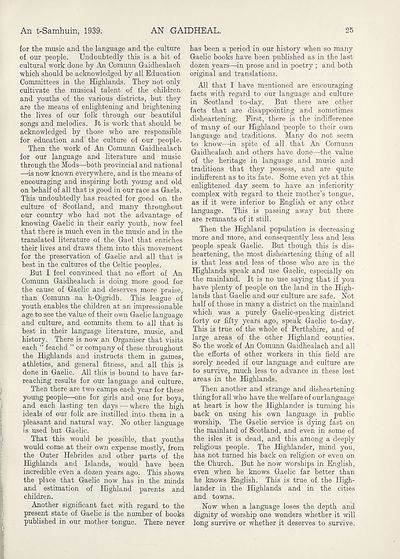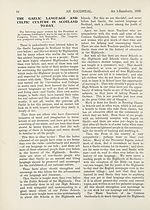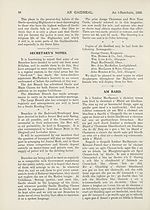An Comunn Gàidhealach Publications > Gaidheal > Volume 35, October 1939--September 1940
(33) Page 25
Download files
Complete book:
Individual page:
Thumbnail gallery: Grid view | List view

An t-Samhuin, 1939.
AN GAIDHEAL.
25
for the music and the language and the culture
of our people. Undoubtedly this is a bit of
cultural work done by An Comunn Gaidhealach
which should be acknowledged by all Education
Committees in the Highlands. They not only
cultivate the musical talent of the children
and youths of the various districts, but they
are the means of enlightening and brightening
the lives of our folk through our beautiful
songs and melodies. It is work that should be
acknowledged by those who are responsible
for education and the culture of our people.
Then the work of An Comunn Gaidhealach
for our language and literature and music
through the Mods—both provincial and national
—is now known everywhere, and is the means of
encouraging and inspiring both young and old
on behalf of all that is good in our race as Gaels.
This undoubtedly has reacted for good on the
culture of Scotland, and many throughout
our country who had not the advantage of
knowing Gaelic in their early youth, now feel
that there is much even in the music and in the
translated literature of the Gael that enriches
their lives and draws them into this movement
for the preservation of Gaelic and all that is
best in the cultures of the Celtic peoples.
But I feel convinced that no effort of An
Comunn Gaidhealach is doing more good for
the cause of Gaelic and deserves more praise,
than Comunn na h-Oigridh. This league of
youth enables the children at an impressionable
age to see the value of their own Gaelic language
and culture, and commits them to all that is
best in their language literature, music, and
history. There is now an Organiser that visits
each “ feachd ” or company of these throughout
the Highlands and instructs them in games,
athletics, and general fitness, and all this is
done in Gaelic. All this is bound to have far-
reaching results for our language and culture.
Then there are two camps each year for these
young people—one for girls and one for boys,
and each lasting ten days — where the high
ideals of our folk are instilled into them in a
pleasant and natural way. No other language
is used but Gaelic.
That this would be possible, that youths
would come at their own expense mostly, from
the Outer Hebrides and other parts of the
Highlands and Islands, Would have been
incredible even a dozen years ago. This shows
the place that Gaelic now has in the minds
and estimation of Highland parents and
children.
Another significant fact with regard to the
present state of Gaelic is the number of books
published in our mother tongue. There never
has been a period in our history when so many
Gaelic books have been published as in the last
dozen years—in prose and in poetry ; and both
original and translations.
All that I have mentioned are encouraging
facts with regard to our language and culture
in Scotland to-day. But there are other
facts that are disappointing and sometimes
disheartening. First, there is the indifference
of many of our Highland people to their own
language and traditions. Many do not seem
to know—in spite of all that An Comunn
Gaidhealach and others have done—the value
of the heritage in language and music and
traditions that they possess, and are quite
indifferent as to its fate. Some even yet at this
enlightened day seem to have an inferiority
complex with regard to their mother’s tongue,
as if it were inferior to English or any other
language. This is passing away but there
are remnants of it still.
Then the Highland population is decreasing
more and more, and consequently less and less
people speak Gaelic. But though this is dis¬
heartening, the most disheartening thing of all
is that less and less of those who are in the
Highlands speak and use Gaelic, especially on
the mainland. It is no use saying that if you
have plenty of people on the land in the High¬
lands that Gaelic and our culture are safe. Not
half of those in many a district on the mainland
which was a purely Gaelic-speaking district
forty or fifty years ago, speak Gaelic to-day.
This is true of the whole of Perthshire, and of
large areas of the other Highland counties.
So the work of An Comunn Gaidhealach and all
the efforts of other workers in this field are
sorely needed if our language and culture are
to survive, much less to advance in these lost
areas in the Highlands.
Then another and strange and disheartening
thing for all who have the welfare of our language
at heart is how the Highlander is turning his
back on using his own language in public
worship. The Gaelic service is dying fast on
the mainland of Scotland, and even in some of
the isles it is dead, and this among a deeply
religious people. The Highlander, mind you,
has not turned his back on religion or even on
the Church. But he now worships in English,
even when he knows Gaelic far better than
he knows English. This is true of the High¬
lander in the Highlands and in the cities
and towns.
Now when a language loses the depth and
dignity of worship one wonders whether it will
long survive or whether it deserves to survive.
AN GAIDHEAL.
25
for the music and the language and the culture
of our people. Undoubtedly this is a bit of
cultural work done by An Comunn Gaidhealach
which should be acknowledged by all Education
Committees in the Highlands. They not only
cultivate the musical talent of the children
and youths of the various districts, but they
are the means of enlightening and brightening
the lives of our folk through our beautiful
songs and melodies. It is work that should be
acknowledged by those who are responsible
for education and the culture of our people.
Then the work of An Comunn Gaidhealach
for our language and literature and music
through the Mods—both provincial and national
—is now known everywhere, and is the means of
encouraging and inspiring both young and old
on behalf of all that is good in our race as Gaels.
This undoubtedly has reacted for good on the
culture of Scotland, and many throughout
our country who had not the advantage of
knowing Gaelic in their early youth, now feel
that there is much even in the music and in the
translated literature of the Gael that enriches
their lives and draws them into this movement
for the preservation of Gaelic and all that is
best in the cultures of the Celtic peoples.
But I feel convinced that no effort of An
Comunn Gaidhealach is doing more good for
the cause of Gaelic and deserves more praise,
than Comunn na h-Oigridh. This league of
youth enables the children at an impressionable
age to see the value of their own Gaelic language
and culture, and commits them to all that is
best in their language literature, music, and
history. There is now an Organiser that visits
each “ feachd ” or company of these throughout
the Highlands and instructs them in games,
athletics, and general fitness, and all this is
done in Gaelic. All this is bound to have far-
reaching results for our language and culture.
Then there are two camps each year for these
young people—one for girls and one for boys,
and each lasting ten days — where the high
ideals of our folk are instilled into them in a
pleasant and natural way. No other language
is used but Gaelic.
That this would be possible, that youths
would come at their own expense mostly, from
the Outer Hebrides and other parts of the
Highlands and Islands, Would have been
incredible even a dozen years ago. This shows
the place that Gaelic now has in the minds
and estimation of Highland parents and
children.
Another significant fact with regard to the
present state of Gaelic is the number of books
published in our mother tongue. There never
has been a period in our history when so many
Gaelic books have been published as in the last
dozen years—in prose and in poetry ; and both
original and translations.
All that I have mentioned are encouraging
facts with regard to our language and culture
in Scotland to-day. But there are other
facts that are disappointing and sometimes
disheartening. First, there is the indifference
of many of our Highland people to their own
language and traditions. Many do not seem
to know—in spite of all that An Comunn
Gaidhealach and others have done—the value
of the heritage in language and music and
traditions that they possess, and are quite
indifferent as to its fate. Some even yet at this
enlightened day seem to have an inferiority
complex with regard to their mother’s tongue,
as if it were inferior to English or any other
language. This is passing away but there
are remnants of it still.
Then the Highland population is decreasing
more and more, and consequently less and less
people speak Gaelic. But though this is dis¬
heartening, the most disheartening thing of all
is that less and less of those who are in the
Highlands speak and use Gaelic, especially on
the mainland. It is no use saying that if you
have plenty of people on the land in the High¬
lands that Gaelic and our culture are safe. Not
half of those in many a district on the mainland
which was a purely Gaelic-speaking district
forty or fifty years ago, speak Gaelic to-day.
This is true of the whole of Perthshire, and of
large areas of the other Highland counties.
So the work of An Comunn Gaidhealach and all
the efforts of other workers in this field are
sorely needed if our language and culture are
to survive, much less to advance in these lost
areas in the Highlands.
Then another and strange and disheartening
thing for all who have the welfare of our language
at heart is how the Highlander is turning his
back on using his own language in public
worship. The Gaelic service is dying fast on
the mainland of Scotland, and even in some of
the isles it is dead, and this among a deeply
religious people. The Highlander, mind you,
has not turned his back on religion or even on
the Church. But he now worships in English,
even when he knows Gaelic far better than
he knows English. This is true of the High¬
lander in the Highlands and in the cities
and towns.
Now when a language loses the depth and
dignity of worship one wonders whether it will
long survive or whether it deserves to survive.
Set display mode to:
![]() Universal Viewer |
Universal Viewer | ![]() Mirador |
Large image | Transcription
Mirador |
Large image | Transcription
| An Comunn Gàidhealach > An Comunn Gàidhealach Publications > Gaidheal > Volume 35, October 1939--September 1940 > (33) Page 25 |
|---|
| Permanent URL | https://digital.nls.uk/125143580 |
|---|
| Description | This contains items published by An Comunn, which are not specifically Mòd-related. It includes journals, annual reports and corporate documents, policy statements, educational resources and published plays and literature. It is arranged alphabetically by title. |
|---|
| Description | A collection of over 400 items published by An Comunn Gàidhealach, the organisation which promotes Gaelic language and culture and organises the Royal National Mòd. Dating from 1891 up to the present day, the collection includes journals and newspapers, annual reports, educational materials, national Mòd programmes, published Mòd literature and music. |
|---|---|
| Additional NLS resources: |
|

